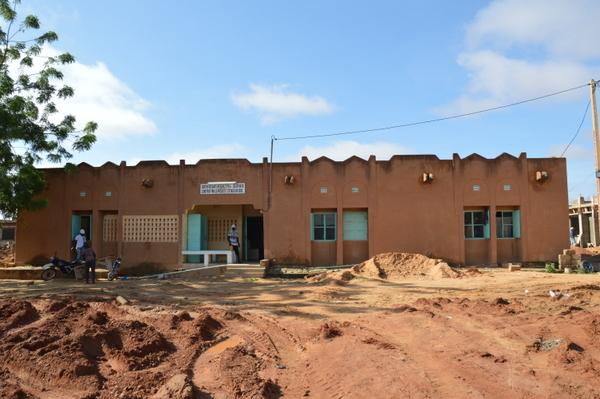Rechercher
Affichage de 330 à 345 sur 102 actualités
-
Priorité aux patients : Améliorer l'accès à la santé dans les zones rurales du Niger
Stephanie EECKMAN | 01/09/2016
Le développement du secteur de la santé est un indicateur important du niveau de développement d’un pays, mais malgré des progrès certains réalisés depuis quelques années -notamment en santé féminine, pédiatrie et chirurgie- le secteur nigérien de la santé a toujours de grandes difficultés à faire face aux besoins de la population et à organiser l’offre de soins. L’accès aux services de santé de base reste limité. On estime que seuls 40 à 50% de la population ont accès aux services publics de santé, alors que 65% recourent de façon régulière aux guérisseurs traditionnels. Cette situation s’explique par la couverture géographique insuffisante des infrastructures sanitaires, des financements mal adaptés (alors que 48% de la population vit sous le seuil de pauvreté) et par le manque de personnel qualifié et de médicaments. Par ailleurs, certains services de haute spécialité, tels que la dialyse ou la chirurgie, ne sont pratiquement pas disponibles dans le pays. A travers le Projet d’Appui au Renforcement du Système de Santé (PARSS); la CTB Niger est en train de mettre en œuvre un projet de construction d’hôpital de grande envergure. La CTB Niger a été mandaté par la coopération belge afin d’assurer la gestion de la mise en œuvre de la construction de l’hôpital de district de Gothèye, en collaboration avec le Ministère de la Santé Publique. La situation du nouvel hôpital à Gothèye est telle qu’elle pourrait devenir un pôle de soins pour 5 districts sanitaires directement avoisinants dont la population se rend actuellement à l’hôpital de district de Téra, situé à une distance de 95 km, soit à l’hôpital national de Niamey (en traversant le fleuve). Grâce au financement de la Belgique, les populations de la région de Tillabéri et les régions avoisinants auront ainsi accès à un hôpital de référence de niveau périphérique, offrant une variété de services telles que les urgences, la pédiatrie, la médecine interne, la chirurgie, ainsi qu’un service de laboratoire et de radiologie. En plus de répondre à un besoin vital des populations de la région, les hôpitaux de district, comme ceux construits dans le cadre de cette intervention, renforcent le système de santé et augmentent la couverture sanitaire globale. Vu que le rôle de la CTB Niger consiste à gérer le projet -en s’assurant de la bonne conception des plans de l’hôpital, de la construction effective du bâtiment, de son équipement, de la mise en place d’un système de gestion pour l’hôpital, ainsi que de de renforcer les capacités de ses partenaires à tous les niveaux- plusieurs étapes clés ont été franchies cette année. Les principales réalisations consistent notamment dans les activités suivantes : l’élaboration d’un schéma directeur pour les hôpitaux ;le recrutement d’un bureau d’études chargé de la conception des plans d’architecture, de l’élaboration des dossiers d’appel d’offres pour la sélection des entreprises et du suivi et surveillance des travaux. Ceci pour les infrastructures et pour les équipements; le suivi et approbation étapes par étapes des études par l’unité de gestion du projet en partenariat avec le Ministère de la Santé Publique à travers la Direction des Infrastructures et Équipements Sanitaires; le lancement du processus d’appel d’offres pour le choix des entreprises ; les signatures des contrats des entreprises sélectionnées ; la remise des sites et lancement des travaux ; le démarrage des travaux La CTB Niger, continue à travailler en étroite collaboration avec le MSP afin d’exécuter des projets similaires. Ainsi, le PARSS mène également le processus de réalisation des travaux de deux autres hôpitaux de districts à Gaya et Damagaram Takaya, la réhabilitation de l’hôpital de district de Loga ainsi que la transformation de quinze cases de santé en Centre de Santé Intégrés. Chiffres clés : Opérationnalisation de l’hôpital de Gothèye : 2017Budget : 961.747.755 Fcfa pour les travaux d’infrastructuresSuperficie de l’infrastructure hospitalière : 1,68 hBénéficiaires estimés : 270.000 personnes Capacité d’accueil : 81 lits Personnel : environ 60 personnes (personnel médical et administratif minimum)
-
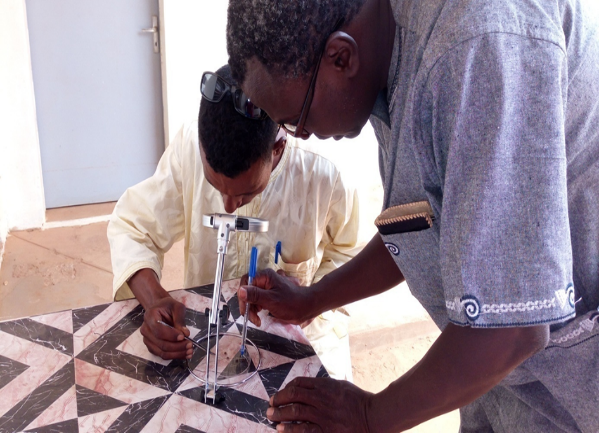
Des animaux sains, le gage de revenus stables
Stephanie EECKMAN | 30/08/2016
Au Niger, le bétail sain joue un rôle absolument fondamental. Mais pour maintenir un troupeau en bonne santé, formations et approvisionnement en médicaments sont indispensables. Mais avec la croissance du cheptel et la pression démographique, les soins vétérinaires sont souvent insuffisants pour garantir une santé optimale des animaux. Le pays ne compte que 126 vétérinaires pour une superficie de 1 267 000 km², soit 1 vétérinaire pour 10 000 km². Un problème de taille, auquel viennent s'ajouter la faible offre en médicaments vétérinaires et le manque d’opportunités de formations après l’obtention du diplôme de vétérinaire. Pourtant, une insuffisance de l’accès aux services de base en matière de santé animale constitue l’un des principaux facteurs de risque économique pour l’éleveur. De ce fait, il est un frein important au développement de l’élevage. Améliorer les services vétérinaires de proximité à travers la formation A travers le Projet d’Appui à la Production Pastorale (PAPAT), la CTB mène différentes actions pour renforcer les capacités des agents de terrain -des techniciens issus des Directions régionale, départementales et communales, ainsi que des Services Vétérinaires Privés de Proximité- pour assurer un service vétérinaire- adaptés aux normes régionales/internationales-dans la région de Tahoua. En effet, l’ensemble des services vétérinaires (fourniture d’intrants, service, conseil) ne peut être performant que s’il est accompagné de formation. Afin de renforcer les capacités de ces techniciens, et selon une démarche participative, un atelier d’identification des besoins de formations a été tenu. Il a impliqué les représentants départementaux de l’élevage de la région et, a permis de ressortir les besoins prioritaires en formation dans le domaine de la santé animale. Ainsi, les thèmes suivants ont été retenus comme prioritaires : i) petites chirurgies animales, ii) techniques de prélèvement, d’’emballage et d’expédition des échantillons au laboratoire, iii) techniques d’évaluation de la biomasse, iv) SIG, v) techniques d’identification des tiques et autres insectes, vi) Techniques d’amélioration de l’alimentation animale, vii) Conduite de l'aviculture villageoise, viii) Technique de communication et ix) Procédures de passation de marchés. Le choix de ces thèmes a tenu compte des besoins réels des agents ainsi que des engagements déjà pris par d’autres partenaires de développement pour la formation des agents d’élevage. Ainsi, une formation relative au thème « Les techniques d'identifications des tiques et autres insectes hématophages, les tests de diagnostiques des parasitoses sanguines.» a été organisé du 12 au 21 avril 2016 en 2 sessions de 5 jours chacune au profit de 37 techniciens venant de tous les départements de la région de Tahoua. Ils ont été instruits sur la biologie et l’écologie des tiques, l’exploitation de la clé d'identification des tiques, les diagnostics des maladies transmises par les tiques, les vecteurs de trypanosome et autres diptères hématophages, la trypanosomoses animales et la trypanotolerance, l’exploitation de la clé d'identification des diptères. Le Laboratoire Central de l’Elevage (LABOCEL), en charge du diagnostic des maladies animales, des recherches vétérinaires et d'enquêtes épidémiologiques au Niger, a assuré cette formation. Chaque module présenté a fait l’objet d’échanges entre les participants et le formateur, ce qui a permis de clarifier et d’approfondir tout aspect sombre du module en question. Et après la phase théorique, les apprenants ont mis en pratique les enseignements des deux jours précédents dans les locaux du LABOCEL de Tahoua. Le renforcement des capacités des agents d’élevage sur « Les techniques d'identifications des tiques et autres insectes hématophages, les tests de diagnostiques des parasitoses sanguines » permet aux agents de distinguer les différents tiques et insectes hématophages, de faire un pronostic précis sur les maladies (parasitoses) transmises par ces vecteurs, de maitriser les techniques d’échantillonnage (collecte, conservation et transmission des prélèvements) et de maitriser les maladies sur le terrain en terme de traitement et de contrôle afin de mieux maitriser les situations sanitaires. Poursuivre de telles formations sur d’autres thématiques est la réponse la plus efficace pour une remise à niveau complète des techniciens et auxiliaires d’élevage. En effet, ces agents vétérinaires constituent la cheville ouvrière du Ministère de l’Elevage et leur formation continue est indispensable pour la qualité des activités à mener, notamment d’assurer la protection du cheptel national et par conséquent, la productivité du cheptel, la sécurité sanitaire des aliments et les revenus des pasteurs.
-
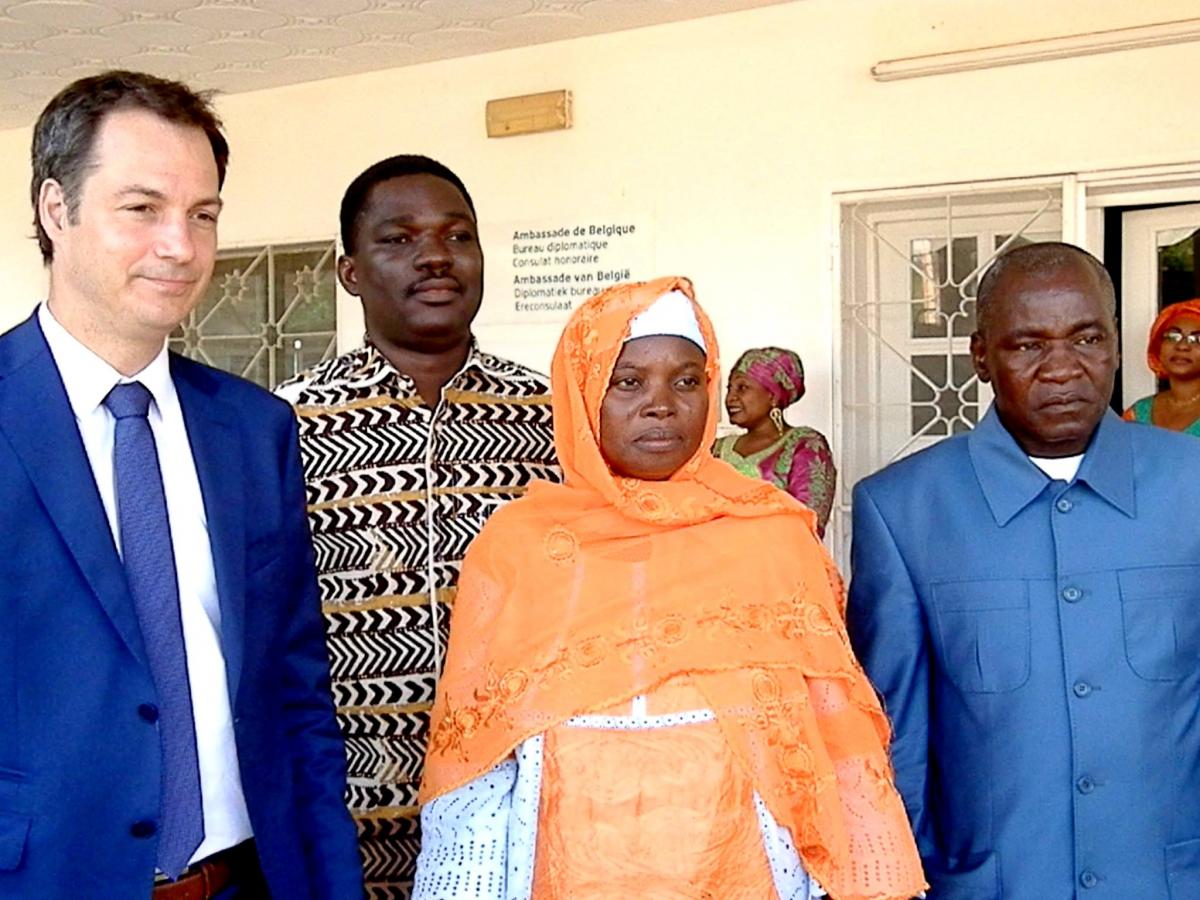
Signature d'un nouvel accord de coopération avec le Niger
Stephanie EECKMAN | 25/08/2016
Le 23 juin dernier, le Vice-Premier Ministre et Ministre de la Coopération au développement Alexander De Croo a visité le Niger. Le but de la visite du Ministre était la Commission Mixte du 22 juin, conclu par la signature du Programme de Coopération 2017-2020 entre les deux pays. Ce nouveau programme de coopération a été signé pour un montant de 33 millions qui s'étaleront sur quatre ans.. Dans ce programme, l'accent est mis sur deux secteurs. Les soins de santé: l'amélioration de l'accès à des soins de santé de première ligne de qualité via le développement d'un système de couverture universelle (14 millions d'euros). L'élevage et la sécurité alimentaire: l'amélioration de la sécurité alimentaire, de la résilience et des revenus des personnes actives dans l'élevage familial (14 millions d'euros). En outre, une enveloppe de 3 millions d'euros sera affectée au renforcement des capacités. La Coopération belge au développement soutiendra également un projet du Fonds des Nations Unies pour la population (FNUAP) qui lutte contre les mariages d'enfants et les grossesses précoces (2 millions d'euros).Avec cette signature, neufs mois de travail de préparation ont connu leur fin. Un nouveau chapitre s’ouvre avec les formulations des deux programmes pour lesquelles les préparations sont déjà en cours, et le démarrage effectif de la mise en œuvre dès 2017. Pendant la visite du Ministre, un petit déjeuner à été organisé aux "one roof" du bureau diplomatique et de la CTB, Nos collègues et partenaires du Programme d’Appui à la Mise en Place des Entités Décentralisés dans la région de Dosso (PAMED2) ont témoignés et échangés avec le Ministre sur la décentralisation et les défis de gouvernance locale et la sécurité alimentaire dans la région de Dosso. L’on peut dire que le Ministre a été séduit par le potentiel d’un tel appui pour améliorer les conditions de vie des Nigériens et Nigériennes. La rencontre avec Mme Hadabi Haoua Bizo et Mr Oumarou Chérif, les maires des communes de Kiéché et Douméga respectivement, a eu un impact particulier sur la visite du Ministre. Kiéché et Douméga font partie des douze communes au Niger qui bénéficient de l’appui du Programme d’Appui à la Mise en Place des Entités Décentralisés dans la région de Dosso (PAMED2) qui a pour but de soutenir les responsables à mieux gérer leur commune de façon transparente, à dialoguer avec la population, à trouver des solutions à leurs principaux problèmes. Lors de cette rencontre, les maires ont partagé leurs expériences avec le PAMED2 et ont stressé l’importance et l’impact du soutien de la coopération belge. « Traditionnellement » a expliqué Hadabi Haoua Bizo « à Kiéché, on cultive le mil, mais ces dernières années, on à eu des récoltes décevantes. Mais on se rend compte que si on produit des tomates ou des oignons, on peut gagner plus d’argent. Alors, avec l'appui du programme on arrive à amménager des sites maraîchers et on conseille les producteurs. Il y avait aussi un problème d’accès aux aliments dans les mois qui précèdent les nouvelles récoltes, les greniers étaient vides et la nourriture hors de prix. Avec l’aide belge, nous avons construit une banque céréalière qui fournit des vivres à un prix abordable. Et en plus de ça, on a soutenu plusieurs activités génératrices de revenu. Par exemple, les femmes les plus vulnérables reçoivent trois chèvres et un bouc, qu’elles «remboursent» lorsque leur élevage est bien lancé. Et comme nos administrés voient ce qu’on fait avec l’argent, le leur et celui qui est fourni par les impôts payés par les citoyens belges, ils sont plus enclins à payer leurs taxes ! La faim recule, et les jeunes retrouvent l’espoir, ce qui freine leur exode ».
-
Emergences des organisations pastorales et leur rôle dans le processus de gestion de la vallée de Tarka au Niger.
Stephanie EECKMAN | 21/07/2016
HABIBOU, Ibrahim est cadre du Ministère à la Direction du développement Régional et local (DDRL) au Niger. Il a fait ses études de Doctorat de 2010 à 2016 à l’Université de Liège à la Faculté des Sciences au Département de Sciences et Gestion de l’environnement. Le titre de sa thèse est « Etude de l'émergence des organisations pastorales et leur rôle dans les processus de gestion partagée de la vallée de la Tarka dans le département de Dakoro (centre sud du Niger) ». Ibrahim a fait le choix de ce thème du fait qu’au Niger l’élevage et les problématiques foncières sont des enjeux majeurs. En effet la réduction des espaces pastoraux à cause de l’augmentation des terres de cultures est source récurrente de conflits fonciers entre les éleveurs et les Agriculteurs au Niger. Il a été sélectionné en 2010 par la CTB du Niger dans le cadre du programme des bourses bilatérales hors-projets. Il a soutenu sa thèse le 15 mars 2016 à Arlon pour l’obtention du grade de Docteur en Sciences de l’environnement. Son travail de thèse lui permettra de renforcer les capacités des ressources humaines pour faire une analyse des dynamiques territoriales dans cet écosystème pastoral. Ce travail est également susceptible de servir de base pour la mise en place de projets de développement des communautés pastorales, et de contribuer à l’accompagnement de la politique de développement au Niger.
-
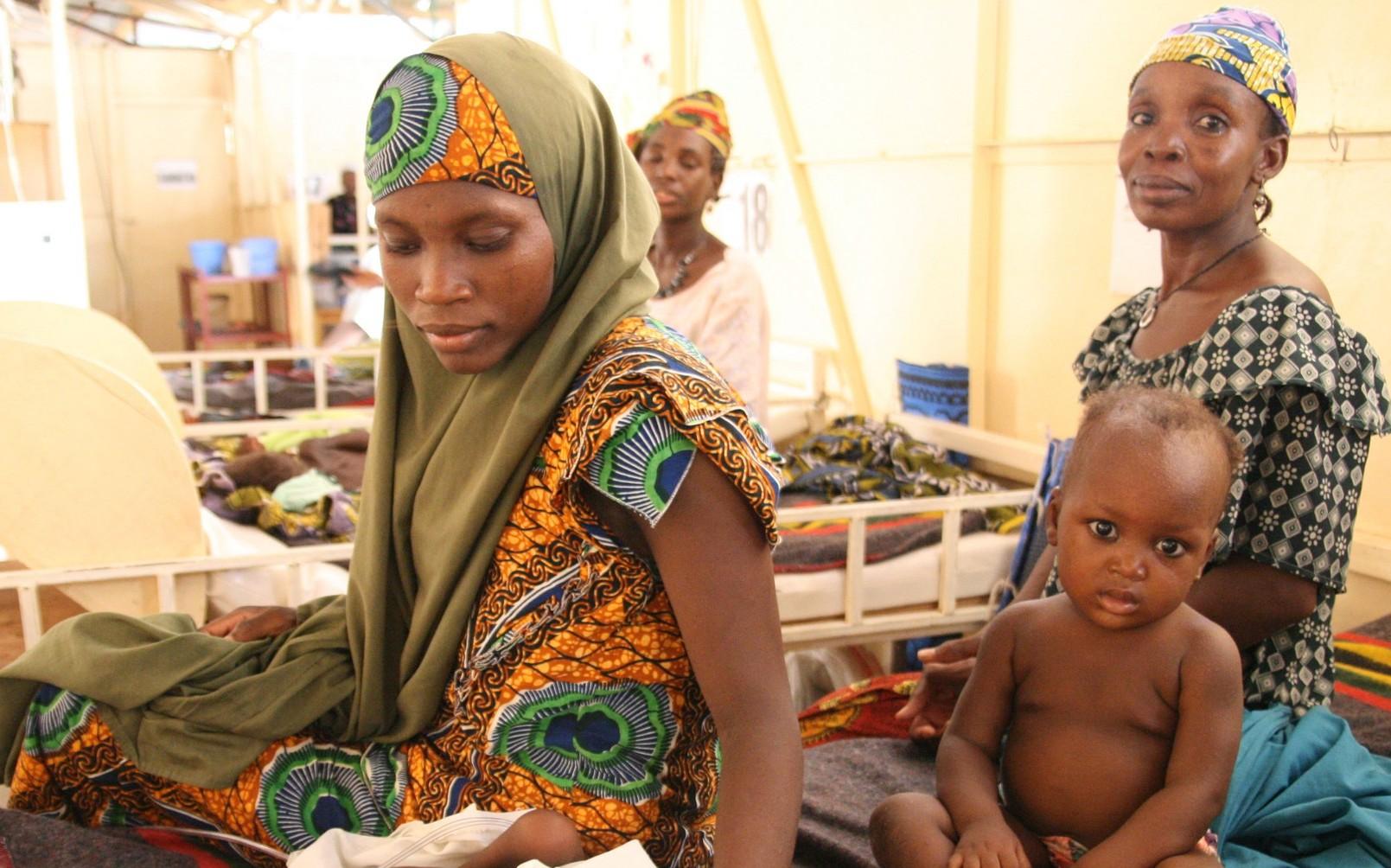
Rehausser l’accès aux soins de santé avec des briques et du mortier
Stephanie EECKMAN | 03/05/2016
Malgré des progrès sanitaires indéniables, les problèmes de santé continue de freiner le développement du Niger. En effet, le fonctionnement du système de santé connaît de nombreux défis qui entravent sa performance et en conséquence, l’accès aux soins par les populations. Dans le cadre du projet d'appui au renforcement du système de santé du niger (PARSS), la coopération nigéro-belge prévoit une amélioration de la couverture sanitaire de la population à travers la construction de trois hôpitaux de District, la réhabilitation de l’Hôpital de District de Loga, la transformation de 25 cases de santé en centres de santé ainsi que le renforcement du système de maintenance dans 9 districts sanitaires. Il faut reconnaître que le PARSS est une untervention de taille à causes des lourds travaux de construction couplés à la mise en œuvre des activités de santé publique. De ce fait, le projet a connu quelques retard dans la phase de conception des projets architecturaux. Mais au mois d’avril, le PARSS vient de finir le démarrage des travaux pour 3 nouveaux hôpitaux de district, respectivement à Gaya, Gothèye et Damagaram Takeya. Les travaux continuent pendant 17 mois pour les 3 HD neufs. L’ensemble des chantiers devrait donc être largement achevés avant la fin du projet. Grâce à la réalisation de ces infrastructures sanitaires dans les trois régions qui en ont tant besoin, les hommes et femmes vivant dans ces zones auront un meilleur accès à un service de base amélioré.
-
Clôture du programme ARIMEL
Stephanie EECKMAN | 03/05/2016
Ce mois-ci, le programme ARIMEL (Appui au Renforcement Institutionnel du Ministère de l’Elevage) sera clôturé. Durant ces 5 dernières années, la CTB a mis en œuvre au Niger l’un de plus importants programmes de renforcement institutionnel. Ce programme, au coût de 3 millions d’euros a été financé conjointement par le Ministère de l’élevage et la CTB. Le programme a apporté des appuis diversifiés qui ont permis de renforcer considérablement les capacités institutionnelles et organisationnelles du Ministère de l'Elevage, tant au niveau central que déconcentré. « Nous sommes fiers d’avoir accompli beaucoup de choses avec relativement peu de budget. Nous sommes surtout fier de la Stratégie de Développement Durable de l’Elevage (2013-2035) et son Plan d’Action, qui ont été élaborés d’une façon participative de tous les acteurs » soulignent Dr. Abouba Saidou, Secrétaire Général Adjoint du Ministère de l’Elevage et Responsable du projet ARIMEL et Dr. Ricarda Mondry, Coresponsable ARIMEL. « En outre, on peut compter l’évaluation et la programmation annuelle avec participation des agents centraux, régionaux et départementaux et de l’élaboration de plusieurs autres outils (référentiel d’emploi, manuel des procédures du fonctionnement, système d’évaluation du personnel) et le fait d’avoir mis un grand nombre d’agents dans les bonnes conditions de travail (matériel et renforcement des capacités) parmi les points forts de l’intervention. » En effet, l’appui d’ARIMEL à contribué de manière importante à l'amélioration des performances et de l'efficience du système de gouvernance et permet d'atteindre les principaux objectifs affichés dans ce sens. Elle permet aussi l'émergence d'une administration moderne, ouverte, transparente et citoyenne, la facilitation de l'accès aux services publics par différents canaux ainsi que l'amélioration de la communication avec le citoyen, la réduction des coûts et le développement de l'efficacité de l'administration. « Nous pensons que cela a contribué à ce que le MEL est aujourd’hui plus efficace qu’il y a 5 ans, et est devenu un exemple pour d’autres Ministères. » concluent Dr. Saidou et Dr. Mondry
-
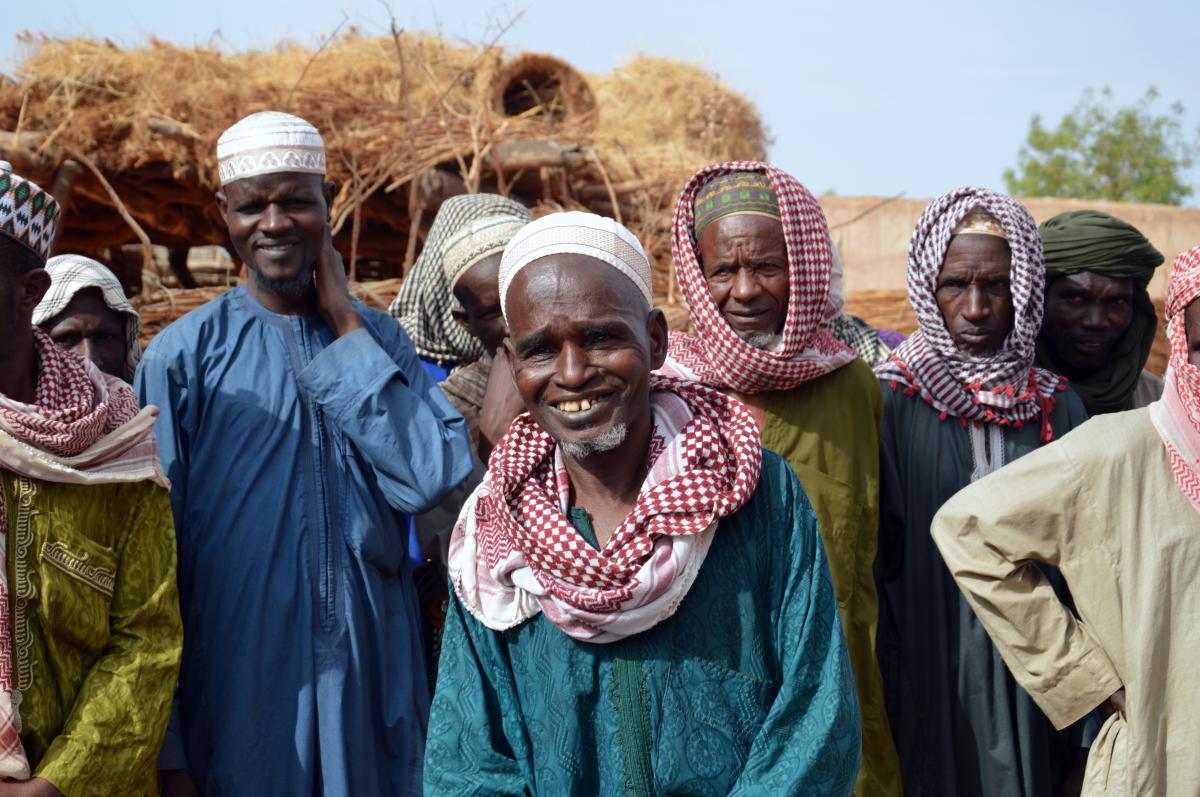
De l’expérience au partage des connaissances
Stephanie EECKMAN | 03/05/2016
La capitalisation est un thème récurrent dans le milieu de la coopération au développement. On ne cesse de le répéter:” Il faut capitaliser!”. Mais pourquoi? Comment? Le programme programme d'appui à la mise en place des entités décentralisées dans la région de Dosso (PAMED2) a voulu relever ce défi et partager de nouvelles connaissances et leçons apprises de manière conséquente et ciblée. Depuis des années -au cours de la première phase et maintenant de la deuxième- l'intervention renforce le processus de décentralisation dans la région de Dosso afin dc'améliorer la sécurité alimentaire. Bien que son rôle a évolué au fil des années, le programme a bâti une stratégie dans laquelle le développement des capacités institutionnelles et organisationnelles des autorités communales occupe une place de choix. Son approche consiste à appuyer les communes pour les aider à prendre eux-mêmes la direction des activités, celles-ci s’emploient à présent à développer des procédures et outils nécessaires en vue de remplir les responsabilités en matière de développement. Si tu veux aller vite, voyage seul, si tu veux aller loin, voyage en groupe Début 2015, le PAMED2 a pris l’initiative de se lancer dans un exercice capitalisation en collaboration avec les services déconcentrés de l’Etat qui accompagnent les communes. L’objectif était de partager les leçons apprises au cours des années. Bien sûr, cet exercice est compris de plusieurs phases. Après l’identification des thèmes à capitaliser, la collecte d’infos et l’élaboration des drafts, un atelier d’écriture a eu lieu quelques mois plus tard dans le centre diocésain Siloé, avec la participation de l’équipe PAMED, le représentant de la commission foncière du Boboye, le secrétaire permanent du dispositif d’alerte précoce et quatre maires . L’intention de cet atelier était de capitaliser – en mettant sur papier – les expériences afin de les partager avec d’autres acteurs. Cet atelier était organisé autour des thèmes convenus lors de la phase de l’identification. Il s’agit notamment de: L’accès durable au foncier pour les femmes rurales L’appui budgétaire aux communes Le dispositif communal d’alerte précoce comme outil de suivi de la vulnérabilité et de la sécurité alimentaire Le dispositif de suivi du développement communal La redevabilité publique des communes En effet, cet atelier de cinq jours – marqué par des partages de vision sur le contexte, la description des pratiques et l’examen de diverses approches- a permis de produire un note de capitalisation sur chacun des thèmes prédéfinis. La présentation des notes de capitalisation qui sera organisé dans quelques mois, sera un forum de discussion pour un débat ou des échanges à l’issue de cette expérience.
-
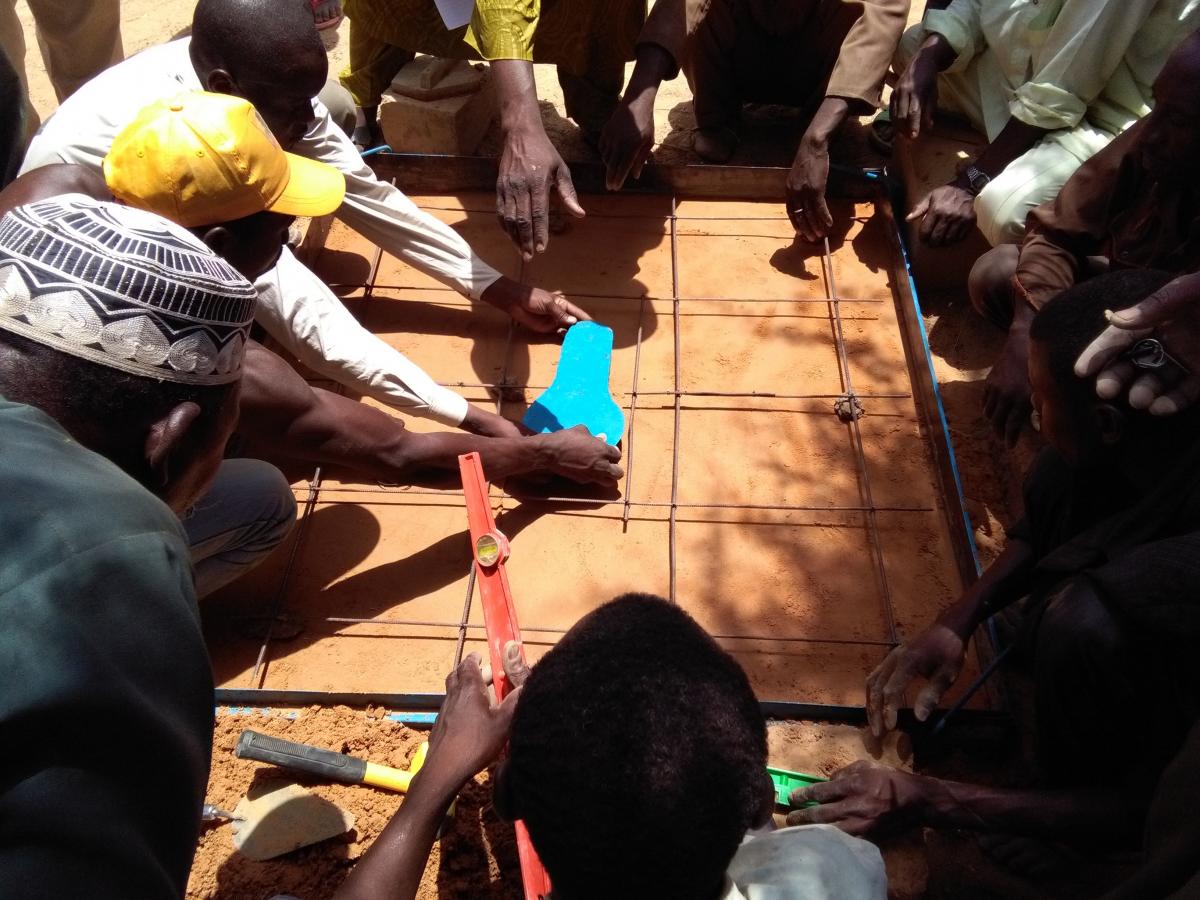
Un petit changement, un grand impact
Stephanie EECKMAN | 03/05/2016
Fournir un accès à des latrines est une condition essentielle de la réalisation des objectifs de santé et d’assainissement, mais garantir la durabilité et un entretien approprié de ces installations n’est pas une mince affaire. Une innovation importante menée par le programma hydraulique vilageoise et pastorale dans la région de Dosso (PHVP2) est l’occasion de rappeler qu’il est essentiel de documenter et de faire connaître les innovations et les meilleures pratiques introduites par les différentes interventions CTB. Une latrine de qualité, élément indispensable pour une famille Au cours de la première phase, le PHVP2 a mobilisé des ressources pour la construction de 2.200 latrines familiales, qui permettent de couvrir les besoins d’assainissement de 15.407 personnes. Mais au cours de l’évaluation de cette première phase, 5 ans après la construction des latrines familiales, il a été trouvé que la plupart se trouvaient déjà en mauvais état, soit effondrées, soit affaissées, soit pleines avec l’impossibilité d’en faire le vidange. Il s’est donc avéré nécessaire d’avoir une réflexion technique sur le sujet, afin d’améliorer les pratiques d’assainissement dans les familles. Un des problèmes majeurs, a été l’utilisation du banco pour la construction de la fosse. En effet, le banco ne concorde pas avec les exigences du terrain dans la zone de dallol où l’argile utilisée est sablonneuse. De plus, le banco, n’étant du matériel solide, les fosses avaient tendance à s’effondrer lors du vidange. Ces simples observations ont soulevé la question suivante: comment assurer la possibilité de faire le vidange et une meilleure durabilité de l’ouvrage ? Suite à cette interrogation, le projet a abouti à la conception d’un nouveau modèle de latrine avec double fosses, construit en matériaux plus durables comme les briques en ciment. Un système simple mais efficace avec deux grands avantages. D’une part, la structure est construite avec des matériaux plus durables. D’autre part, les fosses doubles fonctionnent d’une manière alternante. C’est-à-dire que les deux fosses ne sont pas utilisées en même temps. Lorsque une fosse fonctionne, une autre est fermée et attendent son ouverture au moment où la première est pleine. Une fosse pleine est fermée pendant 24 mois pour permettre la décomposition. Les résidus sont transportés aux champs pour l’agriculture. Ce type de latrine convient particulièrement au Niger car on n’a pas besoin d’eau pour les faire fonctionner, leur entretien est facile. Toutefois, cette amélioration implique aussi des coûts de construction plus élevés, il passent de 15.000 FCFA à 55.000 FCA par latrine. L'equipe du PHVP2 en a tiré la leçon qu’améliorer l’assainissement ne se limite pas à la construction. La réflexion et l’évaluation d’initiatives précédentes permettent de se rendre compte des réussites, mais également d’éventuelles erreurs ou points d’amélioration. Mais cette démarche permet surtout de prendre les mesures nécessaires pour renforcer les points forts du projet, et travailler sur l’amélioration des points faibles.
-
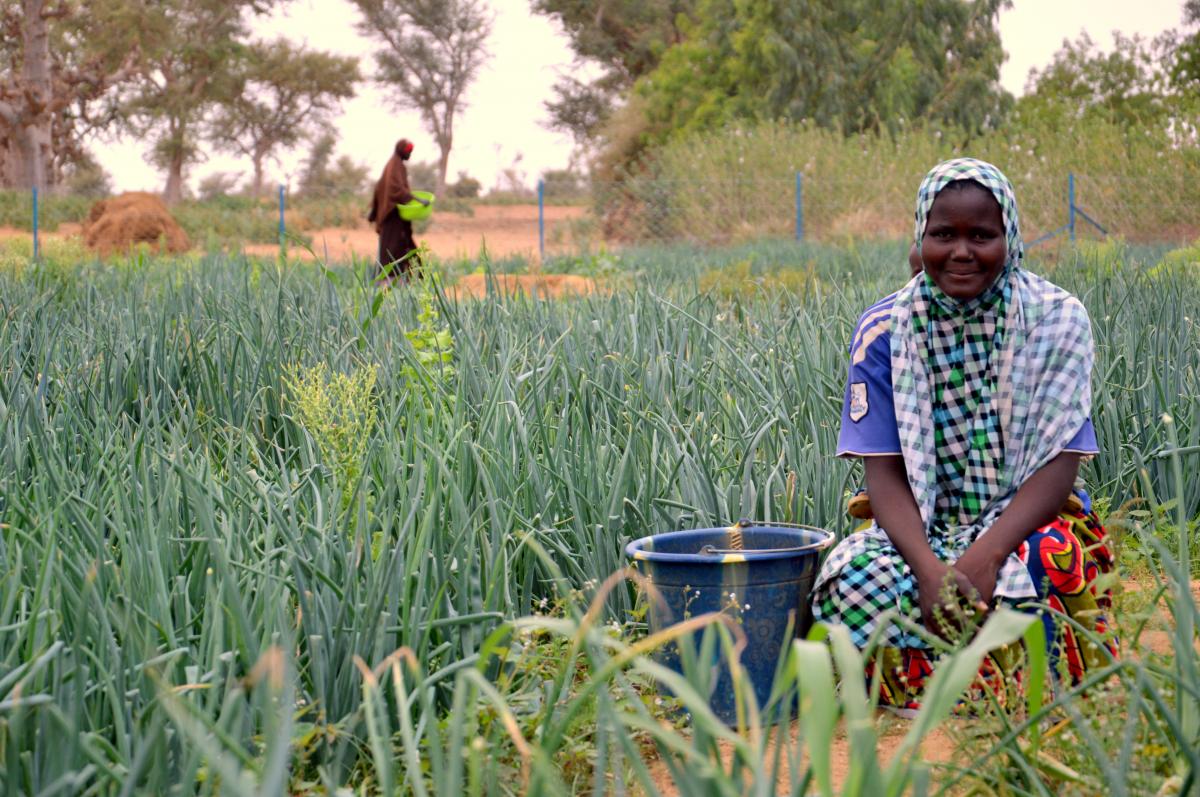
La sécurité alimentaire ne peut se penser sans les femmes rurales
Stephanie EECKMAN | 25/03/2016
Pays du Sahel, le Niger est caractérisé par une situation structurellement déficitaire en termes de production de nourriture, renforçant ainsi le risque de crise alimentaire, qui, elle-même, résulte de plusieurs facteurs souvent cumulatifs, tels que les aléas climatiques; la dégradation des sols et le manque de diversification des productions. Dans le contexte sahélien, la vulnérabilité à l’insécurité alimentaire et les crises alimentaires ont aussi une dimension genre importante, car les femmes sont parmi les plus vulnérables en raison de leurs faibles pouvoirs sociaux et économiques. Leur accès limité aux moyens de production tels que la terre, le crédit et les technologies, et leur faible participation à la prise de décision, réduisant leur capacité de résilience aux chocs. Depuis 2012, à travers le programme d’appui à la mise en place des entités décentralisées de la région de Dosso (PAMED2) , les communes investissent dans l’aménagement des terres agricoles au profit des couches vulnérables afin d’améliorer leur sécurité alimentaire à travers le développement des cultures maraîchères. Dans la pratique, le maraîchage est surtout effectué par les femmes, mais celles-ci sont souvent limitées dans leur activité par le manque d’accès au foncier. Mieux comprendre la dimension genre afin de construire une résilience adaptée « Dès que le mil récolté est consommé, nous, les femmes, commençons à nous débrouiller pour donner à manger aux enfants. » -Haoua Mamane, cultivatrice d’oignons sue le site de Sokorbé, commune de Loga C’est bien pour cela qu’un des objectifs visés est de mettre les femmes à l’abri de l’insécurité foncière et alimentaire par le transfert des droits de propriété de ces terres agricoles sur les sites maraîchers. Le programme a mis en œuvre une stratégie de renforcement des capacités des acteurs du foncier rural et des communautés locales pour que l’accès durable des femmes aux terres des sites aménagés soit une réalité. Bien que le programme PAMED2 a soulevé le problème de la propriété des terres, l’expérience démontre que les sites sur lesquels les aménagements ont été réalisés, appartiennent à des propriétaires fonciers qui prêtent ces sites aux groupements pendant la saison sèche et le récupère pendant la saison des pluies. Et ainsi, les femmes des groupements ne peuvent pas profiter entièrement de la contre-saison, elles ratent également l'opportunité de cultiver les plantes pérennes comme le moringa, l’aubergine, le poivron, le piment, sur toute l’année. Pour remédier à cela, des réflexions sont engagées avec les leaders d’opinions, les maires et les propriétaires fonciers pour que les femmes disposent des terres agricoles pour une exploitation continue en toute saison. De plus, des actions de sensibilisation sont menées pour convaincre les propriétaires fonciers de pratiquer eux-mêmes l’exploitation en toute saison. Cela vise donc à ce que ces propriétaires soient eux-mêmes installés sur une partie du site aménagé et qu’ils bénéficient du même encadrement fourni aux femmes par le programme. En plus de cette option, d’autres propositions ont été faites aux propriétaires fonciers, telles qu’un versement de la dîme à la fin de chaque campagne par les femmes. Le succès des négociations ont abouti à des contrats de prêt pour une exploitation continue en toute saison des terres par les femmes dans la commune rurale de Douméga sur les sites des villages de Tounga Hassada et de Tounga Malamey.
-
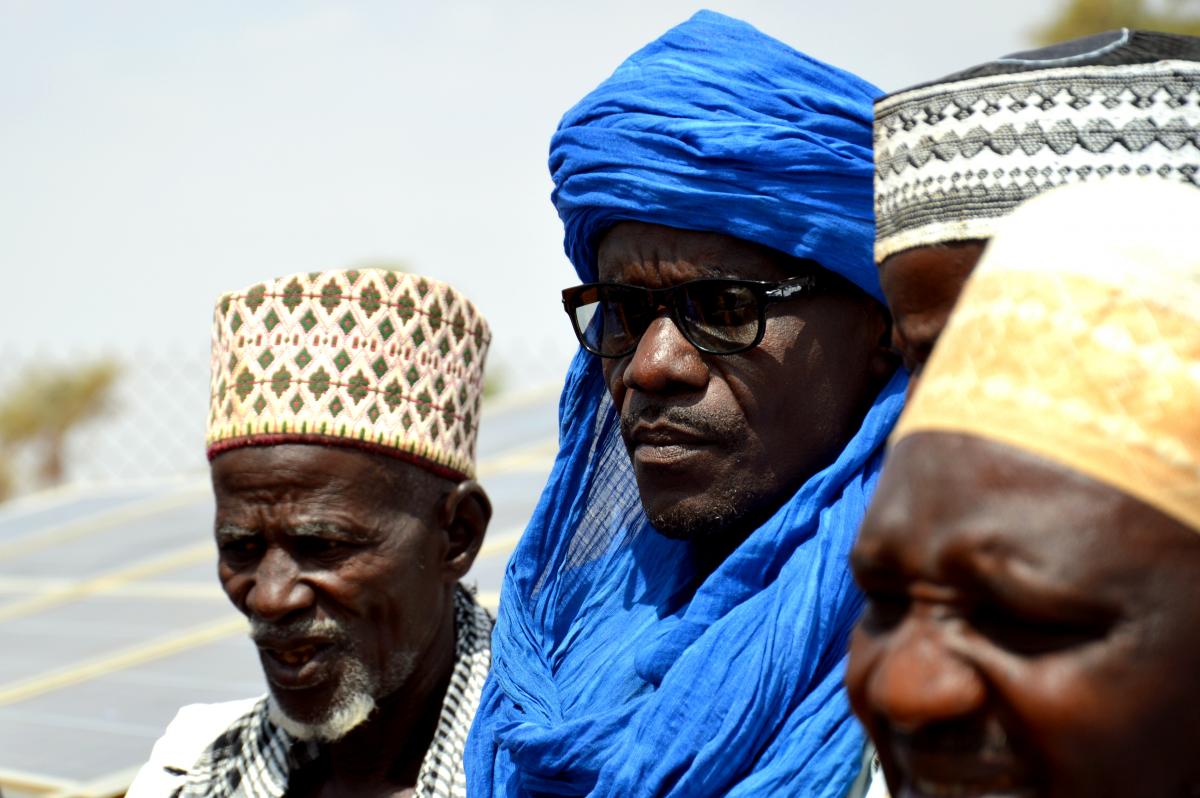
Des points d’eau bien gérés, élément essentiel à la survie des villages
Stephanie EECKMAN | 16/02/2016
Ce n’est un secret pour personne: l’accès à l’eau est un problème majeur pour les populations rurales au Niger. Pourtant, même si le désert couvre les trois quarts de ce vaste pays la nappe phréatique devrait permette de satisfaire les besoins de la population. On estime à 2,5 milliards de mètres cubes le volume annuel des ressources hydrauliques renouvelables. Les solutions – même si leur coût demeure très élevé – sont donc nombreuses. Cependant, c’est la gestion des ouvrages, qui est trop souvent négligée. Pourquoi un Comité de Gestion du Point d’Eau? La question mérite d’être posée! Le défi consiste à trouver l’équilibre entre l’équité de l’accès aux services pour des populations qui ont pour une grande part des revenus très modestes et l’exigence de pérenniser le système de gestion. Malheureusement, il n’y a pas de système de gestion parfait. Il peut y avoir des difficultés, des trous dans la trésorerie, des conflits liés aux différents usages et besoins d’eau, … Pourtant, quelques constantes se retrouvent dans les projets réussis: l’implication des populations dès la conception de l’ouvrage, les investissements dans la formation, l’engagement de la communauté et l’appropriation des structures. Le Programme d’hydraulique villageoise et pastorale s’appuie sur ces facteurs de succès. En impliquant les populations concernées dès la conception de l’ouvrage, le programme s’attaque au point le plus délicat du montage et de la viabilité des points d’eau, à savoir l’appropriation par les comités de gestion et, plus globalement, par les populations villageoises. Les usagers prennent en charge, dès la mise en service, l’entretien et la maintenance de leurs points d’eau. Depuis 2013, 108 points d’eau ont été construits. Pour chaque ouvrage, un comité de gestion, constitué d’usagers, est mis en place de manière démocratique et en essayant de tenir compte du genre. Ce comité est généralement composé de cinq membres : un(e) Président(e), un(e) Trésorier(e), un(e) Secrétaire et deux Hygiénistes. Les membres des Comités de Gestion de Point d’Eau, reçoivent une formation participative pour leur permettre de mieux comprendre et appréhender leurs rôles et leurs responsabilités. Cette formation est animée en une seule session qui dure trois jours. Les principaux thèmes développés sont: la connaissance du projet et de ses partenaires de mise en œuvre ; la connaissance et la gestion de la vie associative ; les règlements d’usage des points d’eau ; la relation entre eau, hygiène et santé. Au final, cette initiative vise à favoriser une dynamique locale, centrée sur la bonne gestion de l’eau et l’établissement d’un modèle de partenariat durable entre usagers et pouvoirs publics, pour la gestion des infrastructures au niveau local.
-
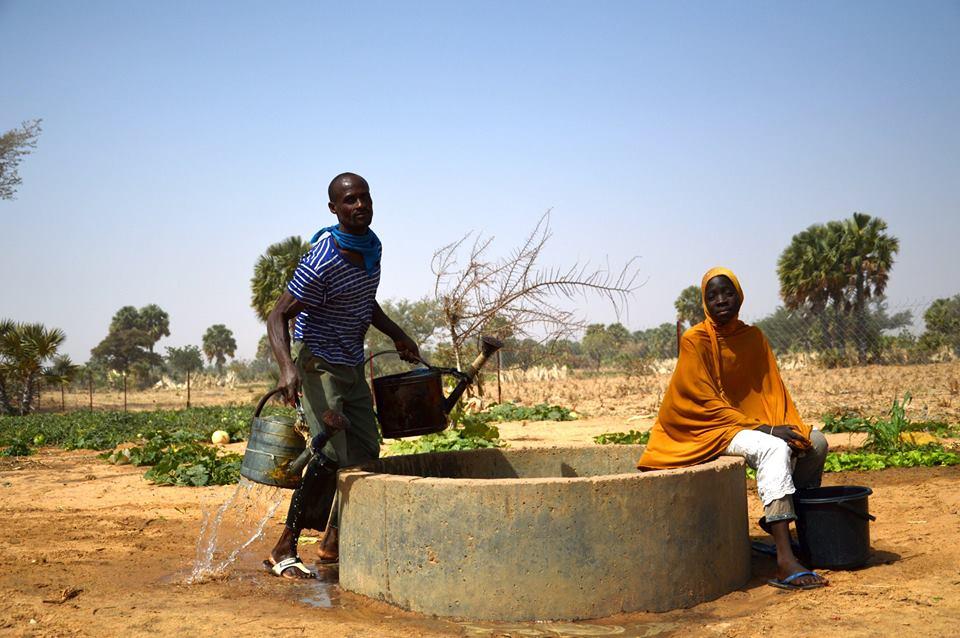
Agir maintenant pour assurer l'avenir
Stephanie EECKMAN | 16/02/2016
La jeunesse et l'agriculture: deux défis majeurs pour le Niger de demainComme dans la plupart des pays africains, l'exode des jeunes ruraux demeure une problématique majeure au Niger. La majorité des agriculteurs nigériens dépendent de la production de mil et de sorgho, mais le rendement de ces cultures n'a pas augmenté au cours des trente dernières années. En outre, la production de ces céréales reste insuffisante pour couvrir la période de soudure - la période entre la fin de la consommation de la récolte de l'année précédente et la récolte de l’année suivante. Bien que cette période dure généralement de juin à septembre, elle peut être beaucoup plus longue, à l’instar de ces dernières années, en raison de l'augmentation de la sécheresse. En bref, les terres au Niger sont de moins en moins rentables, alors que les villages n'ont pratiquement pas d'autres moyens de gagner leur vie. En raison de la faiblesse des secteurs industriels et de services au Niger, le chômage des jeunes demeure très élevé. La jeunesse, notamment celle en milieu rural qui dépasse largement de moitié celle de la totalité du pays (83 % selon UNFPA en 2010), est donc en proie à l’inquiétude. Dans ces conditions, l’attrait des villes et des pays étrangers (Nigéria, Europe) est très fort chez les jeunes ruraux. Aujourd’hui, plus que jamais, ceux-ci attirent irrésistiblement les jeunes en raison des commodités et opportunités qu’elles offrent. Les conséquences négatives de cet exode sont toutefois nombreuses. En outre, la production agricole dans les villages baisse, puisqu’ils se vident de leurs bras valides. « Sans effort supplémentaire, le Niger restera un pays en position d’insécurité alimentaire quasi permanente », affirme Kader Niaoné, Coresponsable du Programme PAMED.Soutenir les jeunes agriculteurs, une voie qui sortira le Niger des cycles récurrents de crises alimentaires.Cette insécurité alimentaire chronique est liée à plusieurs causes, dont la faiblesse d’investissements dans l’agriculture, l’insuffisance de l’encadrement des acteurs du secteur, le difficile accès aux financements... C’est pour cette raison qu’à travers le Programme d’appui à la mise en place des entités décentralisées dans la région de Dosso (PAMED), la CTB travaille en étroite collaboration avec les collectivités territoriales et les communautés locales de la région de Dosso. Sous l’impulsion des communes et à travers l’aménagement de sites maraîchers, par exemple, et l’encadrement de proximité, le Programme a réussi à convaincre les jeunes de rester dans leurs villages après la récolte principale pour s’adonner aux cultures maraîchères de contresaison, qui ont grandement amélioré leurs conditions de vie. En développant une culture parallèle et/ou complémentaire à la culture des céréales, les producteurs sont plus à même d’absorber les chocs en cas de crise alimentaire grâce à la consommation ou à la vente de leurs produits. « Au départ, je partais dès l’annonce de la période de soudure pour revenir dès l’annonce de la période des pluies. J’ai suivi ce mouvement pendant des années », déclare Yahaya Harouna, 36 ans, un habitant de la commune rurale de Douméga. « Mais, cette année, grâce à la vente des pastèques, j'ai gagné beaucoup plus que l’année dernière. » Yahaya cultive des tomates, des choux, des laitues, des oignons et des pastèques, pour ne citer que cela, sur une partie du site maraîcher du groupement Fodi. « Moi, je ne partirai pas. Le maraîchage et la production de contresaison sont plus rentables », affirme-t-il. « C’est le soutien de la CTB à l'aménagement du site et l’échange de savoirs et de pratiques avec les autres membres du groupement qui fait la différence pour moi. »
-
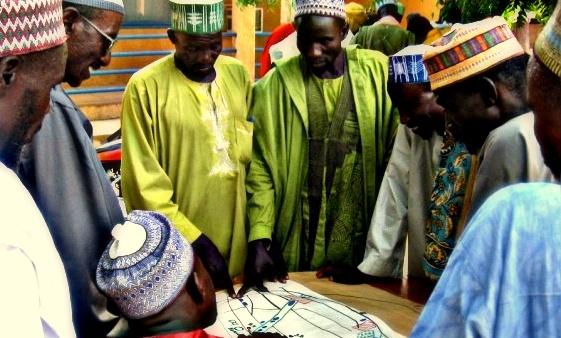
Pérenniser les aménagements pastoraux: l'importance des accords sociaux
Stephanie EECKMAN | 08/01/2016
L’aménagement pastoral reste une préoccupation dans l'élevage au Niger. Afin de prévenir et de limiter les conflits autour de la gestion des ressources naturelles et l’utilisation des aménagements pastoraux, le projet PAAPSSP a développé une démarche d’ingénierie sociale.Mais cette démarche de concertation sociale est-elle bien légitime aux yeux de tous? Permet-elle réellement d’obtenir un consensus durable, ou s’agit-il simplement d’un jeu d’acteurs? Les « acquis » socio-fonciers, issus de cette démarche, sont-ils suffisamment scellés pour ne pas faire l’objet d’une remise en cause à la moindre occasion?Dans la note de réflexion sur le processus d’ingénierie sociale, réalisée en collaboration avec le ministère de l’élevage et le Royal Tropical Institute (KIT), ces questions sont explorés en détail.
